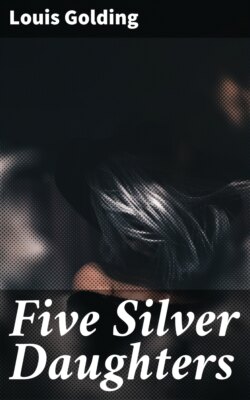Читать книгу Five Silver Daughters - Louis Golding - Страница 12
На сайте Литреса книга снята с продажи.
III
ОглавлениеTable of Contents
“I wish,” said Elsie Silver, yawning, “a few men would turn up!”
She said it the evening Silver brought back the news he had acquired Mr. Horowitz’s business. She said it some evenings later, when she next turned up. Mr. Meyer had still not signed her up again, and she was rather bored. Perhaps she needed a new tail-coat and top-hat and a new song or two before they gave her a job. Perhaps she needed to be a little more respectful towards the local managers, and the audiences, too, perhaps. It was December, not at all the sort of weather a girl chooses to go strolling up and down Oxford Road to see what she can find to amuse her. Not a girl who can help it, that is to say.
And if ever Elsie went strolling up and down Oxford Road, it was not for amusement. It was not for profit either. Does the poet seek the perfect word or the mystic the perfect state to amuse or profit him? Or the hungry stomach food or the desirous loins appeasement or the sea the moon?
Sharp, dark, and hungry were Elsie’s eyes. She knew what she wanted. No, not quite that. She knew what she did not want. In the draughty wings of the shoddy little music-halls, on the blank crowded pavements, in her father’s kitchen—very little, nothing she did want, had been given shape, tint, substance.
Sooner or later, she had hoped, perhaps even an anarchist might appear who might be worth wanting. A Gentile anarchist, that is to say; Jewish anarchists did not disturb her. Why an anarchist less than a monarchist, a count, a clerk? But when her father went and bought old Horowitz’s business, she perceived with displeasure that his new status severely restricted the supply for quite a month or two.
It was strange how very promptly the drought began. After all, the news hadn’t had much time to get about, but certainly quite a lot of the habitués had heard about it by that same evening. A few men did, of course, turn up. Yet you could hardly call Ponski and Pontrevitch men; those little whining poets, with their noses leaking on to their manuscripts. And you couldn’t call Dan Jamieson a man either. Call him a barrel, a fog-horn, a brass band, anything you like, but not a man. You don’t get into bed with a copy of the Clarion and a red tie.
Yes, it was odd how quickly it got about that Silver had become a capitalist. That first evening you could count the number of anarchists on one hand. On Saturday night, the big night, there were hardly more.
“What have I bought these flesh-coloured stockings for?” sighed Elsie. She got quite jumpy, sitting about on the sofa from hour to hour, waiting for the knock of the anarchists, once-twice, then once-twice again. You never knew what new blood a Saturday night brought in. One or two pimpled youths turned up who had not appeared before, or, if they had, had made no impression on anybody. They were aware of the Polar twilight that seemed to be creeping down on Silver’s kitchen, and they felt that in the absence of their betters there might be a look-in for them somewhere with one or other of the Silver daughters. But they mattered as much to Elsie as if they were straws that a gust had blown in through the open door. She settled herself up against the crook of the sofa and closed her eyes, and thrust her head back, dreaming. The glow of the firelight caught the pull of her taut neck and the line was lovely, like a motif drawn by the bow of a master-violinist. In the shallow valley between her breasts all feminine allurement seemed to lie lurking; yet there was a spirit more masculine in those clenched fists and that strict mouth than a whole regiment could assemble of such youths as gazed on her here in the dark kitchen, their palms sweating with desire for her.
They were blue and cold, the eyes she saw, staring in through the gates of her forehead. The hair was gold once, with a muted sheen. Was that a man’s mouth or a woman’s mouth, more womanish than her own, of which the corners were so wryly twisted? That long scar that curled from the crest of the nostril round towards the mouth again—on the cheek of what sort of woman does the rapier impress its so male signature? That wind- and sun-whipped cheek under which the delicate blood too effetely flows—suddenly a flap of flesh hangs loose and the blood flows—ah, the sweet blood! Let me dabble my mouth in the spurting of the blood! Oh, cold blue eyes, never grow warm for love of me!
“Elsie! Elsie!” a woman’s voice was wailing. Hands were clawing at her shoulder. Sarah, May, Susan ...
“She’s fainted! She’s fainted!”
Mrs. Silver’s hands were clacking loose at the wrists as if the bones were broken. “I have not fainted!” protested Elsie. Sarah was almost smothering her with the excessive comfort of her bosom. “Please let me go!” requested Elsie, with distaste.
“What on earth was the matter, Elsie dear?” asked May.
“Nothing at all, my pet! I was just thinking!”
